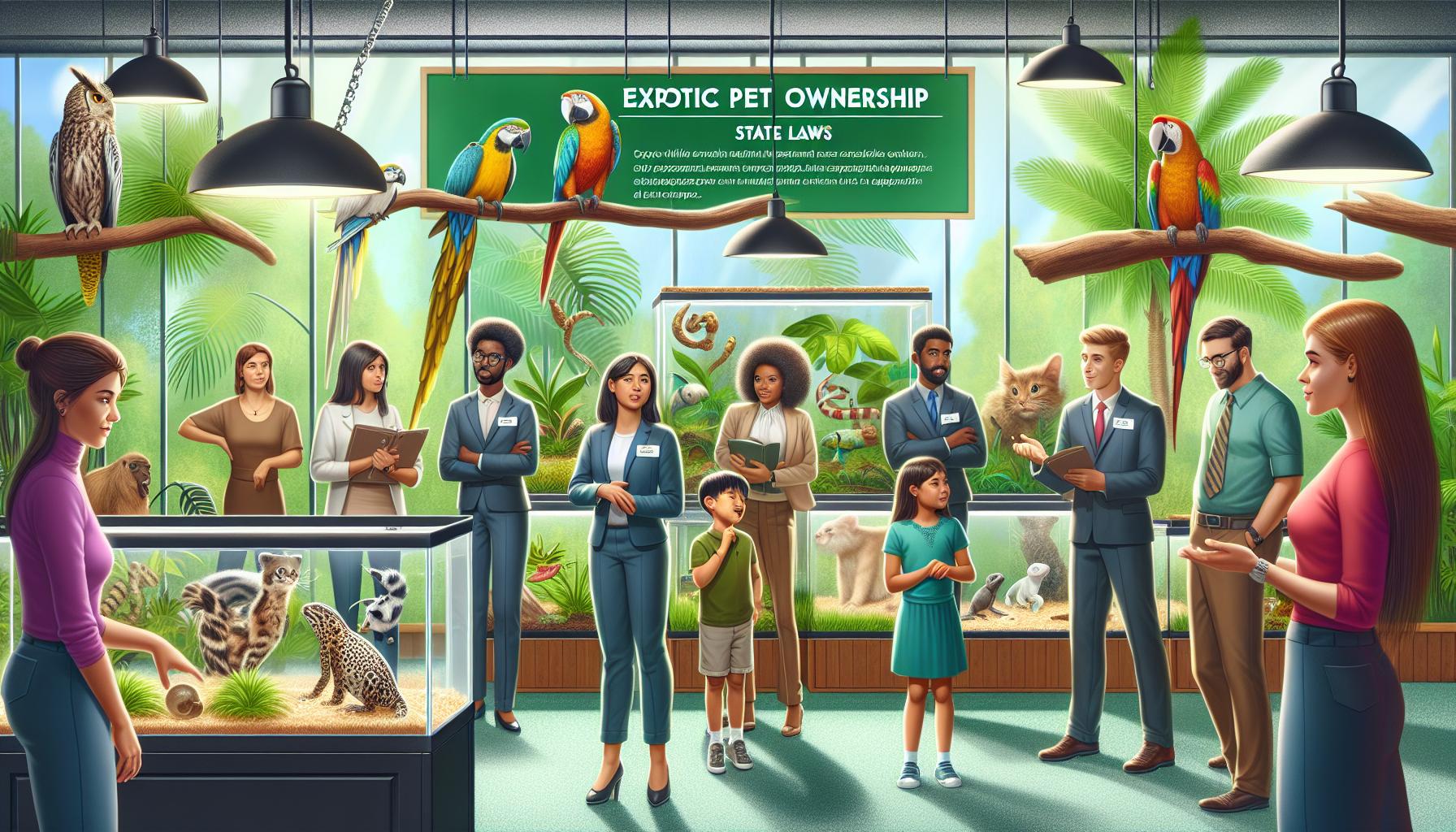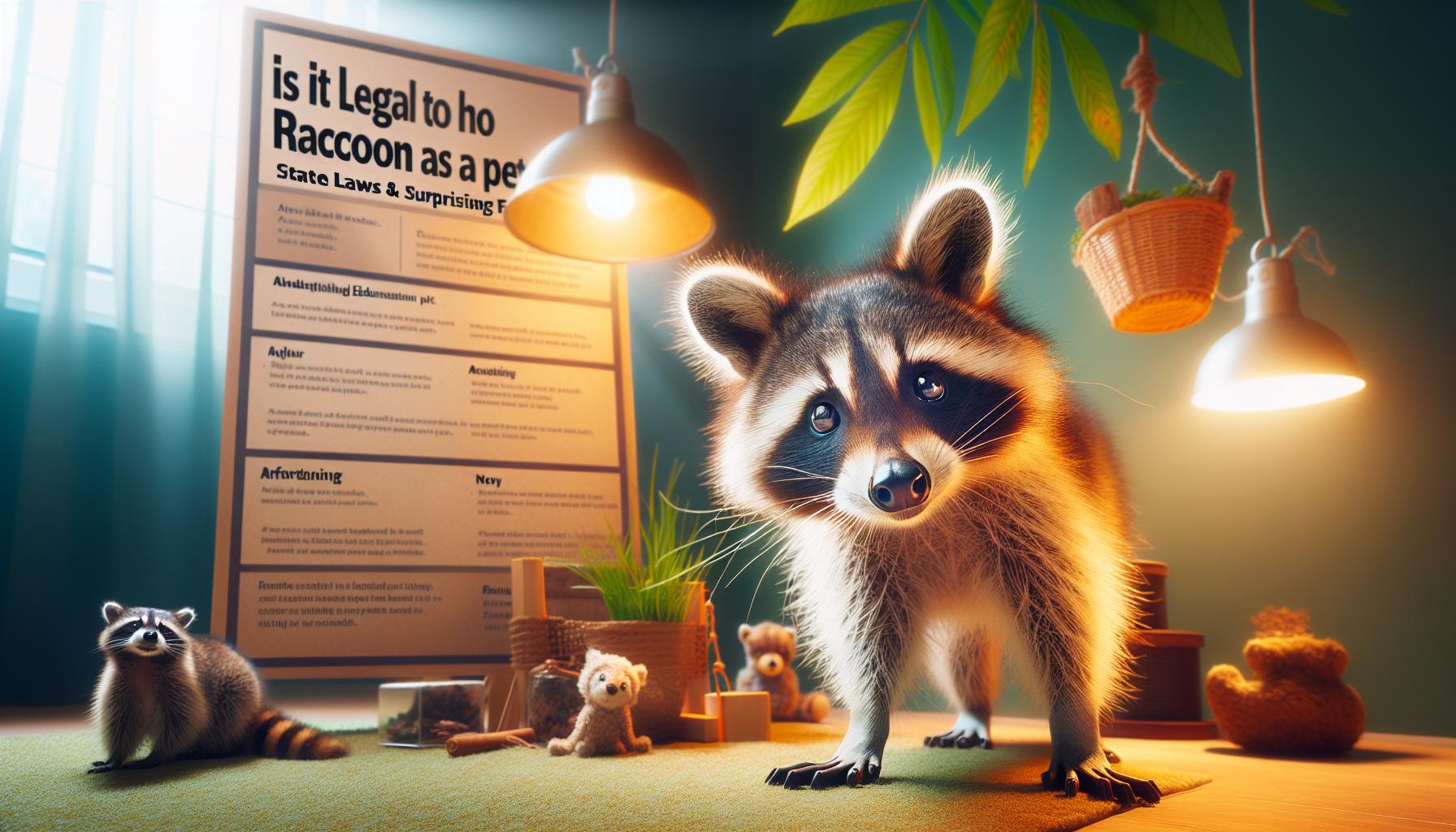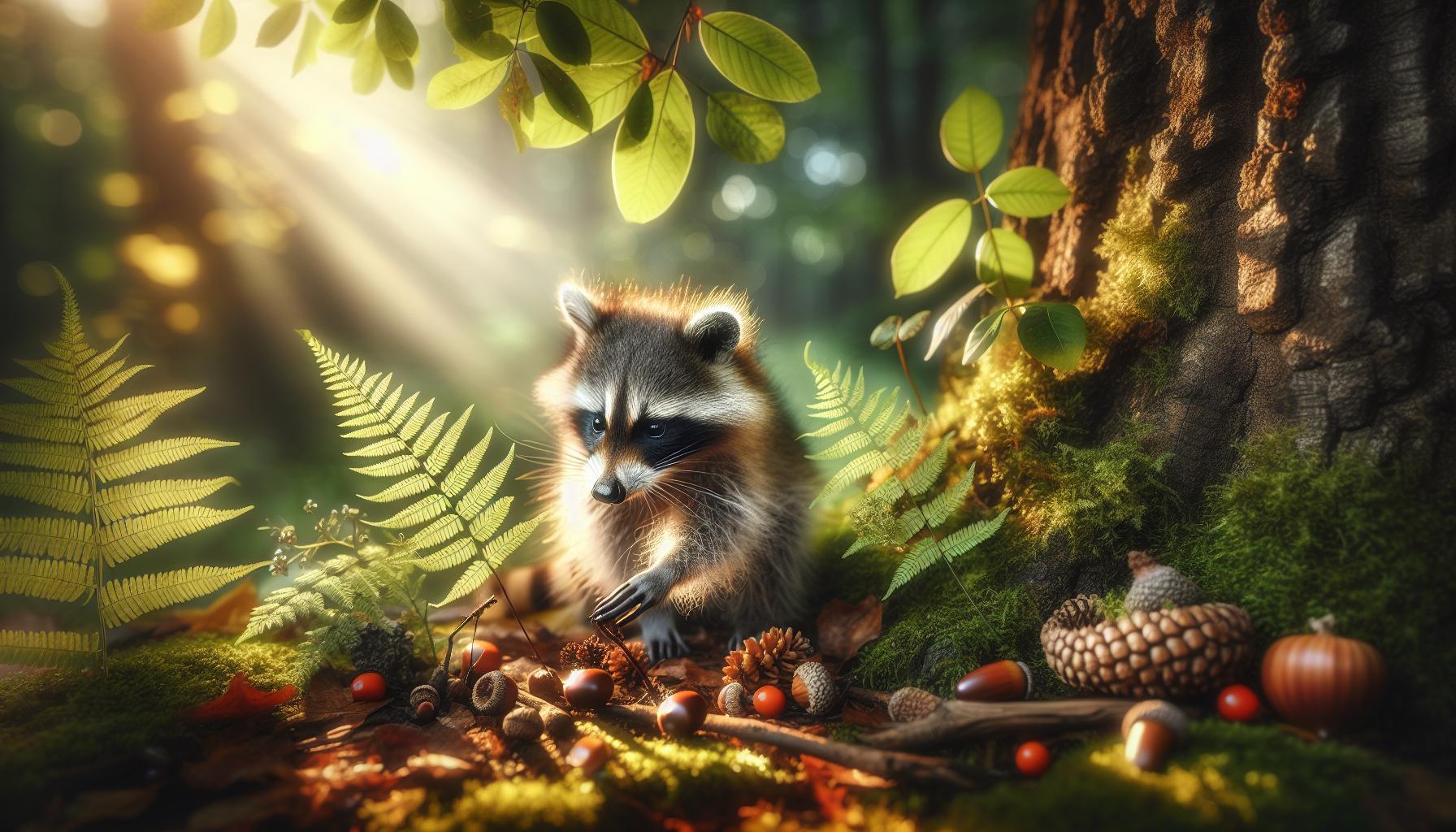Raccoons, with their playful nature and unique bandit-like appearance, are undeniably intriguing creatures. However, considering them as pets raises important legal and ethical questions. While some states allow keeping raccoons as pets, others impose strict laws or outright bans. This guide will navigate the complex landscape of state regulations and provide surprising facts that every potential raccoon owner should know. Understanding these intricacies is essential not only for legality but also for ensuring the welfare of these highly intelligent and social animals in a domestic setting. As you explore the possibilities and responsibilities of raccoon ownership, you’ll uncover what it truly means to share your home with one of nature’s most charismatic mammals.
Contents
- 1 Is Owning a Raccoon Legal in Your State?
- 2 Understanding State Laws on Exotic Pets
- 3 The Pros and Cons of Keeping Raccoons as Pets
- 4 Raccoon Behavior: What You Need to Know
- 5 Essential Care Guidelines for Raccoon Owners
- 6 Common Misconceptions About Raccoons as Pets
- 7 Diet and Nutrition: Feeding Your Raccoon Right
- 8 Socialization and Training Tips for Raccoons
- 9 Raccoons vs. Traditional Pets: A Comparison
- 10 Health Considerations for Raccoon Owners
- 11 What to Expect: Life with a Pet Raccoon
- 12 Wildlife Safety and Ethical Considerations
- 13 Q&A
- 14 Closing Remarks
Is Owning a Raccoon Legal in Your State?
In the realm of exotic pets, raccoons often spark fascination with their cleverness and unique behaviors. However, before considering bringing one into your home, it’s crucial to explore the legal landscape surrounding raccoon ownership, as laws can greatly differ from state to state. In many regions, owning a raccoon is illegal without special permits, largely due to concerns about their health risks, potential for disease transmission, and their impact on local ecosystems.
State-by-State Regulations
The legality of owning a raccoon hinges on the specific laws enacted in your state. Here is a brief overview of how different states approach raccoon ownership:
- States Where Ownership is Generally Prohibited: Many states, including California and New York, have outright bans on keeping raccoons as pets. These laws are rooted in wildlife conservation efforts and attempts to prevent rabies transmission.
- States Allowing Ownership with Permits: Some states, like Florida and North Carolina, may allow pet raccoons if owners obtain wildlife permits. This often involves demonstrating knowledge of their care and proper living conditions.
- States with No Clear Regulations: In a few states, raccoon ownership is legal since there are no specific laws prohibiting it. However, this does not absolve the owner from ensuring the animal’s welfare and adhering to general pet care laws.
It’s imperative for potential raccoon owners to contact local wildlife agencies or governmental bodies to get the most accurate and updated information regarding the legalities in their area. This step not only ensures compliance with the law but ultimately promotes responsible ownership and animal welfare.
Furthermore, becoming aware of how these laws are enforced can provide additional context. Even in regions where raccoons are legally permissible, unexpected inspections or regulations may pose challenges. For those passionate about animal companionship, understanding the legislative framework around raccoon ownership can serve as a foundation for making informed, ethical decisions about bringing one of these enchanting, yet complex creatures into their lives.
Understanding State Laws on Exotic Pets
While the idea of having a raccoon as a pet can be an intriguing one, navigating the maze of regulations surrounding exotic pet ownership is essential. Raccoons possess unique behaviors and attributes that many find appealing, yet state laws concerning raccoon ownership vary significantly, shaped by concerns over public safety and environmental impact. Consequently, understanding these regulations is not just an exercise in compliance; it’s a commitment to responsible pet ownership.
Each state in the United States has its own stance on raccoon ownership, reflecting a balance between wildlife preservation and personal freedom. In states like California and New York, owning a raccoon is prohibited outright, with laws designed to mitigate risks associated with rabies and other zoonotic diseases. Alternatively, some states, such as Florida and North Carolina, permit raccoon ownership with specific permits, imposing criteria that owners must meet, such as providing adequate care and appropriate living conditions. For those considering this pathway, a thorough inquiry into local and state wildlife agency regulations is indispensable.
Even in states where raccoon ownership is permissible, potential owners should remain vigilant about changing laws and enforcement practices. Unexpected inspections or shifts in regulations may complicate ownership, underscoring the need for ongoing education and compliance. It’s worth noting that laws can sometimes be vague, and a lack of explicit prohibitions does not equate to unrestricted ownership; general welfare and pet care laws still apply.
Ultimately, embarking on the journey of raccoon ownership demands a blend of excitement for these captivating creatures paired with a robust understanding of the legal implications. Ensuring one’s personal commitment aligns with the legal framework not only protects the owner but also champions ethical and responsible interactions with wildlife.
The Pros and Cons of Keeping Raccoons as Pets
Raccoons, with their curious faces and playful antics, have become increasingly popular as unconventional pets. However, the decision to bring one of these charming creatures into your home involves careful consideration of both the rewards and the challenges associated with raccoon ownership. These highly intelligent animals can form unique bonds and provide endless entertainment, yet their needs and behaviors can be quite demanding.
One of the most significant benefits of owning a raccoon is their remarkable intelligence. Raccoons are known for their problem-solving skills and dexterity, which can lead to engaging interactions and stimulating challenges for the owner. They can learn tricks, navigate puzzles, and even recognize their names, displaying a level of cognitive ability that rivals some traditional pets. However, their smart and curious nature also means they require constant mental stimulation and enrichment. If they become bored, raccoons might develop destructive behaviors, turning your living space into their personal playground.
On the downside, keeping a raccoon as a pet is not without its complications. Their natural instincts can lead to nocturnal activity, which might disrupt an owner’s sleep schedule. Additionally, raccoons are notorious for being mischievous, often requiring extensive work to raccoon-proof your home. This means securely storing food and belongings, as well as creating a safe, designated space for your raccoon. Potential owners must also consider the significant legal restrictions that vary by state, sometimes requiring special permits or completely prohibiting ownership.
Furthermore, raccoons can pose health risks. They are known carriers of various diseases, including rabies, and their health may require regular veterinary check-ups by professionals experienced with exotic animals. A raccoon’s diet also demands careful attention; it must be varied and nutritious to meet their unique dietary needs, which can be more complex than those of common pets.
In conclusion, while raccoon ownership may present a thrilling adventure filled with joy and companionship, it also carries substantial responsibility. Potential pet owners should weigh the enchanting features of these animals against the commitment they entail, ensuring they can provide the appropriate environment and care needed to support a healthy, happy raccoon. Awareness of and adherence to legal stipulations must also be an integral part of the decision-making process.
Raccoon Behavior: What You Need to Know
Many people are captivated by the whimsical nature of raccoons, often viewing them through a lens of fascination due to their dexterous hands and playful antics. However, understanding the intricacies of raccoon behavior is essential for anyone considering them as potential pets. Raccoons are highly intelligent animals, known for their curiosity and problem-solving abilities. They have an innate drive to explore their environment, often driven by a strong sense of curiosity and a desire for stimulation.
As nocturnal creatures, raccoons are most active during the night, which can be a major factor in pet ownership. They are naturally inclined to rummage through items and explore every nook and cranny of their surroundings, often leading to mischief if not properly monitored. This tendency for exploration can require extensive raccoon-proofing of your home, ensuring that valuable items, food, and potentially harmful objects are secured. As a result, potential pet owners must be prepared for the challenges of keeping a lively raccoon entertained, which may include providing various toys, puzzles, and interactive activities to prevent boredom and destructive behavior.
Raccoons are also known for their social nature. They thrive on interaction and can form strong bonds with their owners. However, their social behavior can complicate ownership; they may require regular socialization and engagement to keep them from feeling isolated or stressed. Recognizing and responding to their need for companionship is vital for their overall well-being. Understanding that raccoons are wild animals at heart, and not domesticated pets, is key to providing the right environment and social structure to foster a healthy and happy raccoon.
In summary, the fascinating behavior of raccoons presents both opportunities and challenges for pet owners. With their clever minds and social nature, they can be rewarding companions, provided you are ready for the demands of their care. Carefully considering their natural instincts and behaviors will not only enrich your experience but also ensure a harmonious coexistence with these unique and spirited creatures.
Essential Care Guidelines for Raccoon Owners
Raccoons are undeniably charming creatures, known for their inquisitive nature and dexterous hands, but proper care is crucial for anyone considering them as pets. First and foremost, potential owners need to be aware of the legalities involved in owning a raccoon, as laws vary widely from state to state. In many places, it’s illegal to keep raccoons as pets without special permits, while other regions may have less stringent regulations. Therefore, before diving into raccoon care, confirm your locality’s regulations to ensure you are compliant with any wildlife laws.
When it comes to housing, raccoons require a secure and spacious environment that mimics their natural habitat. A sturdy, escape-proof enclosure is essential. This space should be equipped with vertical climbing structures, as these animals are natural climbers and thrive when given the opportunity to scale various surfaces. Enclosures should provide both indoor and outdoor spaces, allowing raccoons to explore and exercise safely under supervision. Make sure the outdoor area is well-fenced and shaded, offering them shelter from extreme weather conditions.
Nutrition plays a critical role in a raccoon’s health. Unlike typical domestic pets, raccoons have varied dietary needs characterized by their omnivorous nature. A balanced diet should include high-quality raccoon or cat food supplemented with fruits, vegetables, and lean proteins. Avoid feeding them processed sugary foods or human snacks, which can lead to obesity and health complications. Additionally, fresh water should always be available.
Socialization is another vital aspect of raccoon care. These animals are highly intelligent and social creatures, requiring daily interaction to prevent boredom and behavioral issues. Engage in regular playtime, offer puzzle toys, and even consider using training techniques to stimulate their minds. Consistent interaction helps to strengthen the bond between the pet and the owner, making the experience more rewarding for both parties.
Lastly, regular veterinary check-ups are essential not only for vaccinations but also for monitoring their overall health and behavior. Raccoons can carry specific diseases, so ensuring they are free from health issues is vital for both their well-being and that of their human companions.
Owning a raccoon is a unique and complex responsibility. With the right preparations, regulations, and knowledge of their needs, these captivating animals can make fascinating and beloved companions. However, recognizing their wild instincts and adapting your care approach accordingly will enhance your relationship with your new furry friend.
Common Misconceptions About Raccoons as Pets
Many people are captivated by the playful antics and unique characteristics of raccoons, often leading to misconceptions about their behavior and needs as pets. While it’s tempting to view them as delightful furry companions similar to dogs or cats, there are important truths every potential owner should recognize. Contrary to the belief that raccoons can be easily domesticated, they retain many of their wild instincts. This can result in behavioral challenges that may not align with the expectations of traditional pet ownership.
One common misunderstanding is that raccoons are similar to traditional pets in terms of care requirements, which is far from accurate. Raccoons are highly intelligent and require significant mental and physical stimulation to prevent boredom. Without proper activities, they may engage in destructive behaviors, including foraging through household items or trying to escape enclosures. Existing as omnivores, their dietary needs are also diverse and complex; feeding them a standard pet food diet might not meet their nutritional requirements and could lead to health issues.
Additionally, there is a prevalent myth that raccoons can be litter trained like cats. While some owners report varying degrees of success, many raccoons do not adapt well to using a litter box due to their natural behaviors and instincts focused on exploring and marking territory. Moreover, their playful and sly demeanor often leads to a tendency to hoard items, which can further complicate household life and create challenges in training.
Lastly, the assumption that raccoons can seamlessly integrate into a family, including interactions with children and other pets, can lead to misunderstandings. While many raccoons can form bonds with their human caregivers, their behaviors are unpredictable; they can exhibit territorial or aggressive actions when feeling threatened. Responsible ownership involves recognizing these traits and approaching raccoon care with a respect for their wild nature, rather than projecting human sensibilities onto their behaviors. Understanding these misconceptions is crucial for anyone considering the responsibility of keeping a raccoon as a pet, ensuring both the animal’s welfare and the owner’s satisfaction in their companionship.
Diet and Nutrition: Feeding Your Raccoon Right
In the wild, raccoons are notoriously resourceful omnivores, foraging for a diverse diet that includes fruits, nuts, insects, small animals, and even human food scraps. This dietary flexibility is essential for their survival in varying environments, but it also means that as pets, raccoons have unique nutritional needs that must be carefully managed to ensure their health and well-being. When considering bringing a raccoon into your home, it’s crucial to understand the intricacies of their diet to simulate the variety they would encounter in the wild while ensuring they receive the necessary nutrients.
To effectively feed a pet raccoon, a balanced diet should consist of high-quality commercial raccoon food, supplemented with fresh fruits, vegetables, and protein sources. This could include:
- Fruits: Apples, berries, bananas, and melons can be delightful snacks, providing essential vitamins.
- Vegetables: Leafy greens, carrots, peas, and sweet potatoes are great options to add dietary fiber and nutrients.
- Protein: Cooked eggs, lean meats, or fish should be offered in moderation to support muscle health.
It is important to avoid processed foods, sugary snacks, and anything high in fat, as raccoons can suffer from obesity and related health issues if their diet is not kept in check. This emphasis on a nutritious, varied diet mirrors their wild eating habits while catering to their omnivorous nature.
In addition to their basic diet, hydration is equally essential. Fresh, clean water must always be available, as raccoons require adequate hydration, especially if their diet includes dry foods. Monitoring your raccoon’s weight and overall health will help ensure they are getting the right nutrients; any signs of obesity or malnutrition should prompt immediate dietary adjustments.
Overall, understanding and meeting the dietary needs of a raccoon is vital for anyone willing to responsibly care for this intriguing creature. Providing a high-quality, well-rounded diet not only enhances their well-being but also fosters the playful, curious nature that makes raccoons such captivating companions.
Socialization and Training Tips for Raccoons
Establishing a strong bond with a pet raccoon is essential, and socialization plays a crucial role in ensuring that these intelligent creatures adapt well to domestic life. Raccoons are naturally curious and social animals, but they can also exhibit behaviors typical of wild animals, such as wariness or aggression when introduced to new people or environments. To foster a positive relationship, initiating socialization from a young age is key. Early exposure to various stimuli, including different sounds, people, and safe environments, helps your raccoon become more comfortable and confident.
In a household setting, creating a safe space where the raccoon can explore and interact freely is vital. Allowing them to roam in a secure area enables them to investigate their surroundings at their own pace. Incorporate daily interaction through playtime, using interactive toys that engage their cognitive abilities. Objects like puzzle feeders not only stimulate their minds but also reinforce positive behavior. Always reward good behavior with treats or praise, as this positive reinforcement builds trust and encourages them to repeat those behaviors.
Training a raccoon requires patience and consistency. Start with basic commands, utilizing the same verbal cue for each action you want them to learn, such as “sit” or “come.” Raccoons are fast learners and can pick up tricks, especially if training sessions are kept short and enjoyable. Regular, positive interactions during training help establish a cooperative relationship and enhance their social skills. Remember that raccoons are adept problem solvers, so keep the training engaging to prevent boredom.
Moreover, understanding raccoon behavior is crucial for effective socialization. These animals are known for their mischievousness, and it’s essential to channel this behavior into productive actions. Provide tools for digging or climbing to satisfy their natural instincts. Additionally, socialization isn’t just for the raccoon; teaching family members about raccoon behavior, including their likes, dislikes, and body language, fosters a harmonious living environment. For instance, recognizing when your raccoon feels threatened or overstimulated can help prevent undesirable behaviors and ensure safe interactions.
By nurturing a raccoon’s unique personality through socialization and training, you can cultivate a fulfilling companionship that respects their wild essence while adapting to a domestic lifestyle.
Raccoons vs. Traditional Pets: A Comparison
Owning a raccoon might seem like an exotic adventure, but it’s essential to weigh that against the experience of having more traditional pets like dogs or cats. Raccoons, with their intelligent expressions and mischievous antics, offer a unique companionship that contrasts sharply with the more predictable behavior of your typical house pet. While traditional pets have been domesticated over thousands of years to thrive in human environments, raccoons retain much of their wild nature, leading to various challenges and joys that differentiate them from more conventional pets.
One significant consideration is behavior. Raccoons are known for their curiosity and problem-solving skills, often getting into things they shouldn’t, which can be a source of entertainment or frustration. They require more mental stimulation and physical engagement than many traditional pets. Providing appropriate activities, like climbing structures or puzzle toys, is crucial to prevent boredom-driven mischief. In contrast, while dogs can enjoy walks and games of fetch, their needs are generally easier to manage. Ensuring a raccoon’s needs are met requires a commitment to enriching their environment consistently.
Furthermore, the legal aspect of raccoon ownership varies greatly by state. Many areas have regulations or outright bans on keeping raccoons as pets due to their status as wildlife and the potential for health risks, such as rabies. Conversely, owning dogs and cats is typically governed by less stringent laws and is widely accepted. Always check local legislation before considering a raccoon as a pet, as failure to do so could lead to legal issues and possibly the loss of the animal.
In terms of care, raccoons need specialized diets and habitats tailored to their unique needs. They are omnivorous, requiring a more varied diet than a cat or dog, which can often thrive on commercial pet food. Owners must research and prepare to provide a balanced diet while ensuring that their living spaces allow for natural behaviors, such as climbing and foraging. This level of care is often more intensive compared to that of traditional pets, highlighting the need for potential raccoon owners to be prepared for a distinct lifestyle choice that prioritizes the animal’s wild instincts alongside their domestic life.
Ultimately, the excitement of having a raccoon as a pet is balanced by the challenges and responsibilities it brings. Understanding these differences plays a crucial role in determining whether this exotic pet fits your lifestyle compared to a more traditional furry friend.
Health Considerations for Raccoon Owners
The allure of having a raccoon as a pet comes with a unique set of health considerations that prospective owners must carefully evaluate. Raccoons are wild animals, and although they can adapt to a domestic environment, they are susceptible to a range of health issues that necessitate diligent care. One critical problem is their vulnerability to common diseases such as rabies, which not only poses a risk to the raccoon itself but also raises serious health concerns for other pets and humans. Regular veterinary check-ups and vaccinations are paramount to safeguard against these diseases. Given their wild instincts, raccoons can carry parasites like roundworms and giardia, which necessitate routine fecal examinations and deworming treatments.
Additionally, it’s essential to ensure proper nutrition tailored to a raccoon’s omnivorous diet. They require a varied intake of fruits, vegetables, and protein sources to thrive; improper nutrition can lead to obesity, liver disease, and dental issues. Owners must also be aware of the specific dietary requirements and avoid feeding common pet foods that may not meet their unique nutritional needs. Consulting with a veterinarian experienced in treating exotic pets is vital to develop a suitable dietary plan.
Moreover, raccoons have distinct emotional and psychological needs that directly impact their health. A lack of stimulation can lead to stress and behavioral issues, resulting in anxiety or aggression. It’s crucial to create an environment that includes various forms of enrichment such as climbing structures, toys, and social interaction to keep them mentally and physically stimulated. Owners must be attentive to behavioral changes, as these can often signal underlying health problems or stressors in their environment.
Given these health considerations, assembling a proactive health management strategy is essential for any raccoon owner. Engaging with a vet familiar with raccoons and ensuring you have access to specialized care resources will greatly influence your pet’s wellbeing. By being informed and prepared, owners can help their raccoon live a happy and healthy life while minimizing health risks associated with this exotic companion.
What to Expect: Life with a Pet Raccoon
The experience of living with a pet raccoon can be as rewarding as it is challenging, blending the charm of a playful companion with the complexities of a wild animal’s instincts. Unlike traditional pets, raccoons are naturally curious and highly intelligent, often displaying behaviors that can both entertain and perplex their owners. This captivating mix may draw potential owners into a life enriched with unexpected antics, but it also demands a comprehensive understanding of their unique needs and the realities of their behavior.
Adapting to life with a raccoon means providing an environment filled with stimulation and challenge. Raccoons are notorious for their dexterity and problem-solving skills, capable of unscrewing lids, opening doors, and getting into almost anything! Creating a safe space is paramount; owners should invest in secure enclosures and raccoon-proof areas in and around their homes. For mental engagement, enrich their habitat with climbing structures, tunnels, and interactive toys that cater to their natural instincts. Raccoons thrive on novelty, so rotating their playthings regularly can help keep them entertained and mentally agile.
Socialization and interaction play crucial roles in a balanced life with a raccoon. Unlike cats and dogs, raccoons require both solitude and social stimulation. They bond deeply with their humans, often displaying affectionate behaviors reminiscent of those seen in more traditional pets. However, they also need time to explore independently. A raccoon’s natural inclination to rummage and discover means that their environment should include safe areas for exploration, allowing owners to witness their enchanting discovery process without risking harm.
One must also consider the dietary requirements unique to raccoons. Unlike common household pets, they are omnivorous and have specific dietary needs that must be met to avoid health issues. Diet variations should include fruits, vegetables, and proteins while avoiding commercial pet foods that could lack essential nutrients for their well-being. Regular consultations with a veterinarian experienced in exotic animals can guide owners in maintaining proper health and nutrition for their furry companions, ensuring a long and fulfilling partnership.
While owning a pet raccoon can be a fascinating journey, it is essential to acknowledge that these animals carry inherent wildness. Understanding the balance between nurturing their domestic needs and respecting their wild instincts is crucial for creating a harmonious living situation. With the right preparation and commitment, life with a raccoon can be an exhilarating adventure filled with learning, love, and mutual respect.
Wildlife Safety and Ethical Considerations
Keeping a raccoon as a pet taps into the inherent fascination humans have with wildlife. However, before making such a commitment, potential owners must navigate the complex realms of associated with ownership. Raccoons, despite their playful nature and striking intelligence, are wild animals at heart, and this wildness can pose certain risks to both the animals and their owners.
Understanding local laws is the first step toward responsible ownership. Many states impose regulations or outright bans on the ownership of raccoons due to health and safety concerns, including the potential for rabies and other diseases. It’s crucial to investigate the specific regulations in your state or municipality regarding exotic pets. These laws often exist not only to safeguard the public but also to protect raccoons from improper care. Consult local wildlife regulations or a legal expert before attempting to acquire a raccoon.
Another aspect to consider is the ethical implications of keeping a raccoon as a pet. Wild animals, including raccoons, possess instincts and behaviors that are fundamentally different from domesticated pets. Pet owners must ponder whether they can provide an environment that satisfies their physical and psychological needs. Raccoons are naturally curious, social, and active creatures that thrive in environments that mimic their wild habitats. They require enrichment and stimulation to prevent behavioral issues. Inadequate care may lead to frustration, stress, and even health problems for the animal.
Additionally, ethical pet ownership includes considering the implications of breeding and selling raccoons. The exotic pet trade can contribute to the decline of wild populations and often puts pressure on ecosystems. If raccoons are removed from the wild or bred in captivity, ensuring strict ethical practices in sourcing is essential. If you’re set on having a pet raccoon, consider adopting rather than buying from commercial sources, which may contribute to unethical breeding practices.
In short, while the allure of having a raccoon as a pet may be strong, the realities involve a careful consideration of local laws, ethical obligations, and the complex needs of a wild animal. Every potential owner should strive to create a nurturing environment that respects the raccoon’s natural instincts while also complying with societal safety standards, leading to a more harmonious relationship and protecting both the individual animal and broader wildlife populations.
Q&A
Q: What states allow raccoons to be kept as pets?
A: The legality of owning raccoons varies by state. Some states, like Florida and Ohio, permit ownership with a license, while others, such as California and New York, prohibit it entirely. Always check local laws before considering a raccoon as a pet to ensure compliance with regulations.
Q: Are raccoons safe to keep as pets?
A: Raccoons can pose safety risks due to their wild nature, potential for aggression, and ability to carry diseases like rabies. It’s crucial for potential owners to consider these factors and assess local wildlife regulations while ensuring a safe environment for both the raccoon and other pets.
Q: How much does it cost to care for a pet raccoon?
A: Caring for a pet raccoon includes costs for housing, food, veterinary care, and enrichment activities. Expect to spend between $500 to $1,500 annually, depending on health and dietary needs. Ensure you have a budget in place before acquiring a raccoon as a pet.
Q: Can raccoons be trained like dogs?
A: Raccoons can be trained, but not like dogs. They respond to positive reinforcement and can learn tricks or behaviors, but they maintain an independent nature. Consistent training and socialization are essential to make them more manageable as pets.
Q: What are the common health issues in pet raccoons?
A: Pet raccoons are prone to health issues such as obesity, dental problems, and rabies. Regular veterinary check-ups, vaccinations, and a balanced diet are crucial for maintaining their health. It’s important to educate yourself on potential health risks before ownership.
Q: How do raccoons compare to traditional pets?
A: Raccoons differ significantly from traditional pets like dogs and cats in terms of behavior and needs. While they can be affectionate, they are more challenging to care for, requiring specific care routines and environments. Consider these aspects carefully before deciding.
Q: What should I feed my pet raccoon?
A: A balanced diet is crucial for a pet raccoon, typically consisting of high-quality kibble, fruits, vegetables, and protein sources. Consult a veterinarian for specific dietary recommendations to ensure their health and well-being.
Q: What are the ethical considerations of owning a raccoon?
A: Ethical considerations include the animal’s welfare, its natural instincts, and its adaptability to captive life. Owning a raccoon may not fulfill its psychological and physical needs, leading to stress and behavioral issues. Consider these factors extensively before making a decision.
Closing Remarks
Considering bringing a raccoon into your home? Understanding the legality and implications is essential before making such a unique choice. While some states allow raccoon ownership, others impose strict regulations, emphasizing responsible pet care and wildlife conservation. Dive deeper into our resources on raccoon care and how to ensure a thriving environment if you choose to adopt. Don’t miss out on related articles about nocturnal animals and their behavior for a fuller understanding of these captivating creatures.
If you’re curious about more fascinating wildlife facts or how to care for various exotic pets, be sure to sign up for our newsletter. Stay informed and engaged as you explore the rich tapestry of animal science and responsible ownership. Your adventure into the world of unconventional pets starts here-let’s make informed decisions together! Share your thoughts and experiences in the comments below; we’d love to hear from you!





